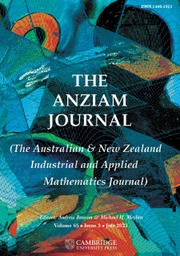Article contents
Large deviations and quasi-stationarity for density-dependent birth-death processes
Published online by Cambridge University Press: 17 February 2009
Abstract
Consider a density-dependent birth-death process XN on a finite state space of size N. Let PN be the law (on D([0, T]) where T > 0 is arbitrary) of the density process XN/N and let πN be the unique stationary distribution (on[0,1]) of XN/N, if it exists. Typically, these distributions converge weakly to a degenerate distribution as N → ∞ so the probability of sets not containing the degenerate point will tend to 0; large deviations is concerned with obtaining the exponential decay rate of these probabilities. Friedlin-Wentzel theory is used to establish the large deviations behaviour (as N → ∞) of PN. In the one-dimensional case, a large deviations principle for the stationary distribution πN is obtained by elementary explicit computations. However, when the birth-death process has an absorbing state at 0 (so πN no longer exists), the same elementary computations are still applicable to the quasi-stationary distribution, and we show that the quasi-stationary distributions obey the same large deviations principle as in the recurrent case. In addition, we address some questions related to the estimated time to absorption and obtain a large deviations principle for the invariant distribution in higher dimensions by studying a quasi-potential.
- Type
- Research Article
- Information
- Copyright
- Copyright © Australian Mathematical Society 1998
References
- 9
- Cited by


